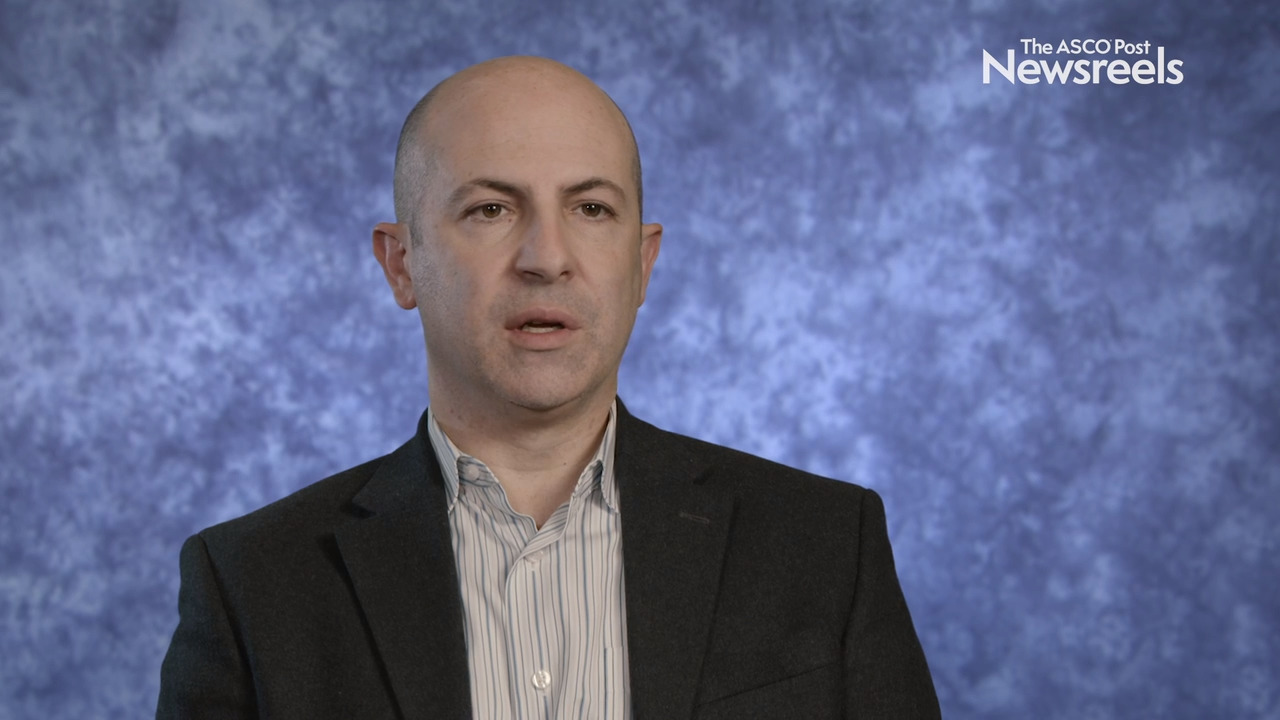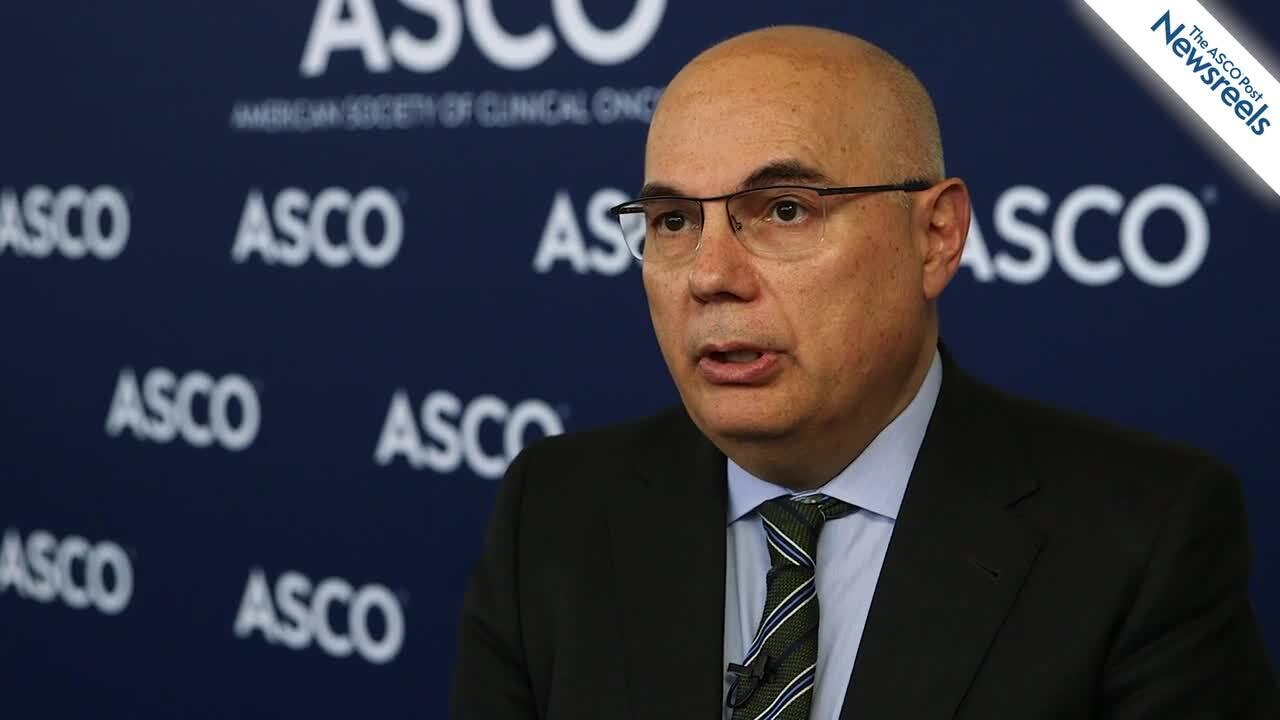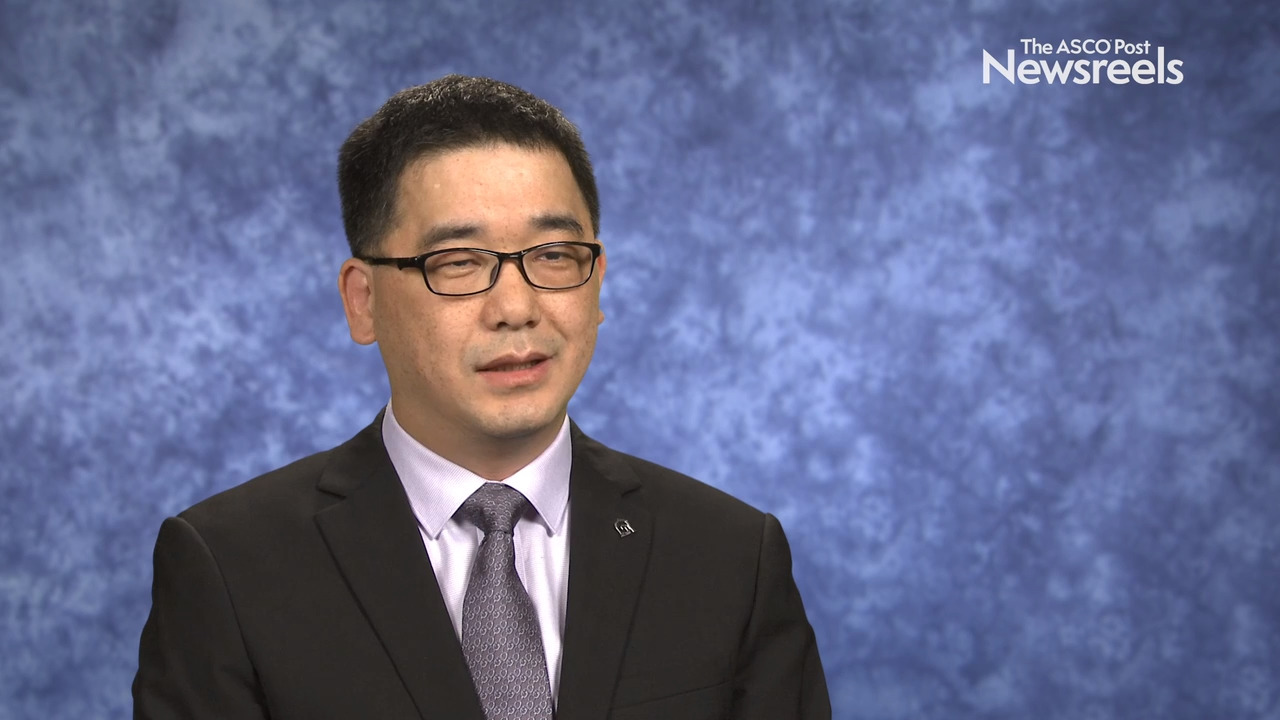FDA Pipeline: Priority Reviews in Lung Cancers, Lymphoma
This week, the U.S. Food and Drug Administration (FDA) granted Priority Review to treatments for non–small cell and small cell lung cancers, as well as for diffuse large-B cell lymphoma (DLBCL); Breakthrough Therapy designation to an antibody-drug conjugate for bladder cancer; and a double Fast...
FDA Pipeline: Priority Reviews in Lymphoma, Lung Cancer, GIST, and Breast Cancer
This week, the U.S. Food and Drug Administration (FDA) granted Priority Review to agents in lymphoma, lung cancer, gastrointestinal stromal tumors, and breast cancer, and granted Fast Track designation to a first-in-class radioenhancer hafnium oxide nanoparticle in head and neck cancer. Priority...
Does Treating Individuals for H pylori Infection Reduce Gastric Cancer Risk in Those With a Family History of the Disease?
In a large Korean single-center study reported in The New England Journal of Medicine, Choi et al found that eradication of Helicobacter pylori infection was associated with a reduced risk of gastric cancer in individuals with a family history of gastric cancer in first-degree relatives. As stated ...
Brian M. Wolpin, MD, on Performance of a Blood-Based Test for the Detection of Multiple Cancers
Brian M. Wolpin, MD, of Dana-Farber Cancer Institute, discusses a noninvasive blood test evaluating methylation of circulating free DNA. In his study, the blood test detected multiple gastrointestinal cancers at a sensitivity of approximately 81% and a prespecified specificity of > 99%. It also accurately localized the tissue of origin across more than 20 cancer types (Abstract 283).
Zev A. Wainberg, MD, on PD-L1–Positive Advanced Gastric Cancer: MSI and Combined Positive Score and Pembrolizumab vs Chemotherapy
Zev A. Wainberg, MD, of the UCLA Medical Center, discusses the first subset analysis of how a combined positive score in gastric and gastroesophageal junction cancers related to the efficacy of pembrolizumab in PD-L1–positive disease (Abstract 427).
2020 GI Cancers Symposium: Does Receipt of Palliative Care Increase Survival in Patients With Metastatic Esophageal Cancer Declining Chemotherapy?
Patients with metastatic esophageal cancer who declined chemotherapy but received palliative care had a numerically higher, but not statistically significant, difference in overall survival. These findings will be presented by Manguso et al at the 2020 Gastrointestinal Cancers Symposium (Abstract...
Cancer No Longer Scares Me
Cancer was a disease I feared until 3 years ago, when I was diagnosed with gastric cancer. After receiving the diagnosis, I knew I didn’t have any time to indulge in fear; I had to take action if I was going to survive. In hindsight, symptoms of the cancer, including some fatigue and indigestion,...
2020 GI Cancers Symposium: Detecting GI Tumors Using a Cell-Free DNA Test
A blood-based screening test using cell-free DNA to identify methylation signals of hard-to-detect gastrointestinal (GI) cancers could potentially help detect disease at earlier stages. This research will be presented by Brian M. Wolpin, MD, MPH, and colleagues at the 2020 Gastrointestinal Cancers...
FDA Approves Avapritinib for the Treatment of PDGFRA-Mutated Gastrointestinal Stromal Tumor
On January 9, the U.S. Food and Drug Administration (FDA) approved avapritinib (Ayvakit) for the treatment of adults with unresectable or metastatic gastrointestinal stromal tumor (GIST) that harbors platelet-derived growth factor receptor alpha (PDGFRA) exon 18 mutation. This approval includes...
Working to Improve Survival Rates in Pancreatic Cancer
Although pancreatic cancer survival rates have slowly improved over the past few decades for all stages of pancreatic cancer combined, the 1-year rate is 20%, and the 5-year rate is about 9%. There is no single diagnostic test to detect pancreatic cancer, and less than 20% of tumors are confined to ...
Combination of Atezolizumab and Bevacizumab for Unresectable Hepatocellular Carcinoma
Combination therapy with the programmed cell death ligand 1 inhibitor atezolizumab and the vascular endothelial growth factor inhibitor bevacizumab significantly improved overall and progression-free survival in patients with unresectable hepatocellular carcinoma compared with sorafenib, according...
FDA Pipeline: Recent Designations in Hepatocellular Carcinoma, Cholangiocarcioma, Lymphoma, and More
Over the past few weeks, the U.S. Food and Drug Administration (FDA) granted reviews or designations to treatments for gastrointestinal cancers and lymphoma, and also provided authorizations for products designed to screen for malignancies and tumor mutational burden. Priority Review for Nivolumab...
Trifluridine/Tipiracil in Recurrent, Metastatic Gastric or Gastroesophageal Junction Adenocarcinoma
Early in 2019, trifluridine/tipiracil tablets were approved for the treatment of adult patients with metastatic gastric or gastroesophageal junction adenocarcinoma previously treated with at least two prior lines of chemotherapy that included a fluoropyrimidine; a platinum; either a taxane or...
Pivotal Study Reports Positive Findings in Fourth-Line Setting for Advanced GIST
In a late-breaking, oral presentation at the European Society for Medical Oncology (ESMO) 2019 Congress, Margaret von Mehren, MD, presented results from INVICTUS, a pivotal phase III clinical study of ripretinib in patients with advanced gastrointestinal stromal tumor (GIST).1 Ripretinib is an...
Circulating Tumor DNA: A Prognostic Marker in Stage III Colon Cancer?
Circulating tumor DNA in the blood could serve as a marker of prognosis in patients with colon cancer receiving adjuvant oxaliplatin, according to a subanalysis of the IDEA trial, presented at the European Society for Medical Oncology (ESMO) Congress 2019.1 After 2 years of adjuvant...
Maximizing Benefit in the Treatment of Immune-Mediated Colitis
Immune-related colitis is the second most common toxicity associated with checkpoint inhibitors, affecting up to 40% of patients. The ASCO Post interviewed Yinghong Wang, MD, PhD, Director of Medication-Induced Colitis and Enteritis, Director of Fecal Microbiota Transplantation, and Associate...
Pivotal Phase III Study Evaluates Investigational TKI in Fourth-Line Setting for Advanced GIST
In a late-breaking, oral presentation at the ESMO Congress 2019, Margaret von Mehren, MD, presented results from INVICTUS, a pivotal phase III clinical trial of ripretinib in patients with advanced gastrointestinal stromal tumor (GIST).1 Ripretinib is an investigational tyrosine kinase inhibitor...
Machine-Learning Model May Predict Unplanned Hospitalizations After Radiation Therapy for Gastrointestinal Cancer
Unplanned hospitalizations may be common among patients with cancer, but they diminish quality of care while racking up high costs for patients and the health-care system alike. According to data presented at the 2019 ASCO Quality Care Symposium, however, a new predictive model may help providers...
Trifluridine/Tipiracil Survival Benefit for Patients With Metastatic Gastric Cancer Who Had or Had Not Undergone Prior Gastrectomy
In a subgroup analysis of the phase III TAGS trial (TAS-102 Gastric Study) reported in JAMA Oncology, David H. Ilson, MD, PhD, and colleagues found positive trends in survival benefit with trifluridine/tipiracil treatment vs placebo for patients with pretreated metastatic gastric cancer or...
Individual Patient Meta-analysis of Microsatellite Instability as a Prognostic Marker in Resectable Gastric Cancer
In an individual patient data meta-analysis reported in the Journal of Clinical Oncology, Pietrantonio et al found that microsatellite instability (MSI) status was a strong prognostic marker in patients with resectable gastric cancer. The study involved data from 1,556 patients with resectable...
New NCCN Guidelines®: First to Address Small Intestine Cancers
THE NATIONAL COMPREHENSIVE Cancer Network® (NCCN®) recently announced the publication of a new set of recommendations focused on cancers in the small intestine. The NCCN Clinical Practice Guidelines in Oncology (NCCN Guidelines®) for Small Bowel Adenocarcinoma are the first treatment guidelines in...
FDA Pipeline: Designation in CLL, New Drug Application in GIST, New Prostate Ablation System Receives 510(k) Clearance
Recently, the U.S. Food and Drug Administration granted Breakthrough Therapy designation to acalabrutinib in chronic lymphocytic leukemia (CLL), accepted a new drug application for avapritinib in some types of gastrointestinal stromal tumors (GIST), and granted 501(k) clearance to market the...
Brief Update on Clinical Trials of New Treatments in Gastrointestinal Cancers
The 2019 ASCO Annual Meeting provided attendees with an abundance of clinically relevant abstracts in gastrointestinal cancers. Briefly featured here are clinical trial updates on pembrolizumab in the second-line treatment of hepatocellular carcinoma (KEYNOTE-240 trial), laparoscopic vs open...
Ramucirumab Plus Pembrolizumab in Previously Treated Advanced Gastroesophageal Cancer, NSCLC, and Urothelial Carcinoma
Results from a phase IB trial expansion stage reported in The Lancet Oncology by Herbst et al showed the combination of ramucirumab plus pembrolizumab had manageable toxicity and antitumor activity in previously treated advanced gastroesophageal cancer, non–small cell lung cancer (NSCLC), and ...
FDA Approves New Trastuzumab Biosimilar
On June 14, the U.S. Food and Drug Administration (FDA) approved trastuzumab-anns (Kanjinti) for all approved indications of the reference product trastuzumab (Herceptin): for the treatment of HER2-overexpressing breast cancer and HER2-overexpressing metastatic gastric or gastroesophageal junction...
Trifluridine/Tipiracil in Recurrent, Metastatic Gastric and Gastroesophageal Junction Adenocarcinoma
In the Clinic provides overviews of novel hematology and oncology agents, addressing indications, mechanisms of action, administration recommendations, safety profiles, and other essential information needed for the appropriate clinical use of these drugs. On February 22, trifluridine/tipiracil...
ESMO World GI 2019: Incidence of Gastric Cancer in Younger Individuals
The incidence of gastric cancer has been increasing in younger individuals, and those under 40 with chronic digestive symptoms should be more actively investigated. These findings follow new data from a retrospective, observational study in Mexico, which showed that 1 in 7 of over 2,000...
Study Shows Benefit With Pazopanib in Treatment of Carcinoid Tumors
Pazopanib significantly improved progression-free survival by 47% in patients with progressive carcinoid tumors, in a prospective randomized phase II trial presented at the 2019 ASCO Annual Meeting.1 “With these results, Alliance A021202 becomes the first randomized study to show that the vascular...
Study Supports Neoadjuvant Chemotherapy in Operable Colon Cancer
For patients with operable colon cancer, neoadjuvant chemotherapy resulted in numerous benefits in the FOxTROT trial but did not reach target significance for the primary endpoint. The study was presented at the 2019 ASCO Annual Meeting by Matthew T. Seymour, MD, of the University of Leeds School...
Expert Point of View: Ian Chau, MD
IAN CHAU, MD, a consultant medical oncologist at the Gastrointestinal and Lymphoma Units of The Royal Marsden NHS Foundation Trust in London and Surrey, United Kingdom, was the invited discussant of KEYNOTE-062. In an interview with The ASCO Post, he first commented that although single-agent...
KEYNOTE-062: Pembrolizumab Is a New First-Line Option in Gastric/Gastroesophageal Junction Cancer
KEYNOTE-062, a study of first-line treatment in patients with advanced gastric or gastroesophageal junction adenocarcinoma, found pembrolizumab to be noninferior to chemotherapy and perhaps better than chemotherapy in a subgroup of patients. The results were reported at the 2019 ASCO Annual Meeting ...
FDA Approves New Trastuzumab Biosimilar
Today, the U.S. Food and Drug Administration (FDA) approved trastuzumab-anns (Kanjinti) for all approved indications of the reference product trastuzumab (Herceptin): for the treatment of HER2-overexpressing breast cancer and HER2-overexpressing metastatic gastric or gastroesophageal...
Does Adding HIPEC to Cytoreductive Surgery Improve Outcomes in Patients With Gastric Cancer and Peritoneal Metastases?
In a propensity score analysis reported in the Journal of Clinical Oncology, Bonnot et al found that the addition of hyperthermic intraperitoneal chemotherapy (HIPEC) to cytoreductive surgery improved outcomes among patients with gastric cancer with peritoneal metastases. The study included 277...
Josep Tabernero, MD, PhD, on Advanced Gastric or Gastroesophageal Junction Adenocarcinoma: Pembrolizumab With or Without Chemotherapy vs Chemotherapy
Josep Tabernero, MD, PhD, of the Vall d’Hebron Institute of Oncology, discusses phase III findings of the KEYNOTE-062 study showing that, for some patients with advanced gastric or gastroesophageal junction cancer, pembrolizumab may improve survival and may be an effective alternative to chemotherapy, with fewer side effects (Abstract LBA4007).
2019 ASCO: KEYNOTE-062: Pembrolizumab With or Without Chemotherapy vs Chemotherapy in Advanced Gastric or GEJ Adenocarcinoma
The randomized, phase III KEYNOTE-062 trial achieved its primary endpoint, showing that for patients with programmed cell death ligand 1 (PD-L1)-positive, HER2-negative, advanced gastric or gastroesophageal junction (GEJ) cancer, initial therapy with pembrolizumab resulted in noninferior overall...
Study Finds Less Chemotherapy Noninferior to More in Frail and Elderly Patients With Advanced Gastroesophageal Cancer
A large randomized trial has found that frail and elderly patients with advanced gastroesophageal cancer may be safely and successfully treated with dose-reduced chemotherapy. In the GO2 phase III trial, low doses of oxaliplatin/capecitabine performed similarly to intermediate and high doses of the ...
Trastuzumab Deruxtecan in Advanced HER2-Positive Gastric and Breast Cancers
Two phase I studies reported in The Lancet Oncology indicate activity of the antibody-drug conjugate trastuzumab deruxtecan in advanced HER2-positive gastric cancer and advanced HER2-positive breast cancer previously treated with trastuzumab emtansine (T-DM1). Trastuzumab deruxtecan (DS-8201a) is a ...
New ASCO Guidelines on Early Detection and Treatment of Colorectal Cancer in Resource-Stratified Settings
ASCO has approved two new resource-stratified guidelines aimed at improving the early detection and treatment of colorectal cancer in all resource settings. The guidelines are a continuation of ASCO’s efforts to provide evidence-based recommendations for the management of malignancies applicable...
Perioperative Therapy With FLOT vs ECF/ECX in Locally Advanced Gastric Adenocarcinoma
In the German phase II/III FLOT4 trial reported in The Lancet, Al-Batran et al found that perioperative therapy with the docetaxel-based triplet FLOT (fluorouracil [5-FU]/leucovorin, oxaliplatin, and docetaxel) was associated with improved overall survival vs ECF/ECX (epirubicin and cisplatin plus...
Study Finds Shorter Treatment Course for Rectal Cancer May Actually Improve Outcomes
In patients with locally advanced rectal cancer, the delivery of all radiotherapy and chemotherapy neoadjuvantly—with a shorter course of radiation—may improve the chance of complete response and downstaging over conventional treatment, according to investigators from Washington University, St....
New Data in Colorectal, Neuroendocrine, Gastric, and Hepatocellular Cancers
THE ANNUAL GASTROINTESTINAL CANCERS SYMPOSIUM took place earlier this year in San Francisco. In addition to important studies captured in our past few issues, The ASCO Post here briefly summarizes additional interesting studies. Adjuvant Hyperthermic Intraperitoneal Chemotherapy in Colon Cancer...
FDA Approves Trastuzumab-qyyp in HER2-Overexpressing Breast and Gastric Cancers
The U.S. Food and Drug Administration (FDA) has approved trastuzumab-qyyp (Trazimera), a biosimilar to trastuzumab (Herceptin), for the treatment of human epidermal growth factor receptor-2 (HER2)-overexpressing breast cancer and HER2-overexpressing metastatic gastric or gastroesophageal...
FDA Approves Trifluridine/Tipiracil for Recurrent, Metastatic Gastric and GEJ Adenocarcinoma
ON FEBRUARY 22, the U.S. Food and Drug Administration approved trifluridine/tipiracil tablets (Lonsurf)—a fixed combination of trifluridine, a nucleoside metabolic inhibitor, and tipiracil, a thymidine phosphorylase inhibitor—for adult patients with metastatic gastric or gastroesophageal junction...
Study Shows Limited Antitumor Activity of Pembrolizumab in Neuroendocrine Tumors
Neuroendocrine tumors appear resistant to single-agent immunotherapy, according to the results of the KEYNOTE-028 trial of pembrolizumab. “Pembrolizumab monotherapy showed limited antitumor activity but a manageable safety profile in patients with previously treated, advanced neuroendocrine...
FDA Approves Trifluridine/Tipiracil for Recurrent, Metastatic Gastric and GEJ Adenocarcinoma
On February 22, the U.S. Food and Drug Administration approved trifluridine/tipiracil tablets (Lonsurf)—a fixed combination of trifluridine, a nucleoside metabolic inhibitor, and tipiracil, a thymidine phosphorylase inhibitor—for adult patients with metastatic gastric or...
Addition of First-Line Ramucirumab to Cisplatin and Fluoropyrimidine in Metastatic Gastric or Gastroesophageal Junction Adenocarcinoma
In the phase III RAINFALL trial reported in The Lancet Oncology, Fuchs et al found no apparent benefit of the addition of the VEGFR-2 inhibitor ramucirumab to first-line cisplatin and fluoropyrimidine treatment in metastatic gastric or gastroesophageal junction adenocarcinoma. Study Details The...
First-Line Trastuzumab Plus Pembrolizumab Shows Efficacy in Patients With Metastatic Esophagogastric Cancer
When added to first-line chemotherapy in patients with untreated metastatic HER2-positive esophageal, gastroesophageal junction, and gastric adenocarcinoma, the combination of pembrolizumab and trastuzumab produced responses in 87% of patients, with 100% of patients experiencing disease control and ...
Andecaliximab in Untreated Gastric or Gastroesophageal Junction Cancer
The large phase III GAMMA-1 trial failed to replicate the encouraging findings from a previous smaller study of andecaliximab plus chemotherapy in untreated HER2-negative gastric or gastroesophageal junction adenocarcinoma, according to Manish A. Shah, MD, of Weill Cornell Medicine/New York...
Rongbo Lin, MD, on Gastric Cancer: Results From the FNF-004 Trial
Rongbo Lin, MD, of Fujian Cancer Hospital, discusses phase II study findings on FOLFOX alone vs paclitaxel plus FOLFOX vs intraperitoneal paclitaxel plus FOLFOX as a first-line treatment in advanced gastric cancer (Abstract 6).
Manish A. Shah, MD, on Gastric Cancer: Results From the GAMMA-1 Study on First-Line Combination Therapy
Manish A. Shah, MD, of NewYork–Presbyterian/Weill Cornell Medical Center, discusses phase III data on the efficacy and safety of andecaliximab combined with mFOLFOX6 as first-line treatment in patients with advanced gastric or gastroesophageal junction adenocarcinoma (Abstract 4).





